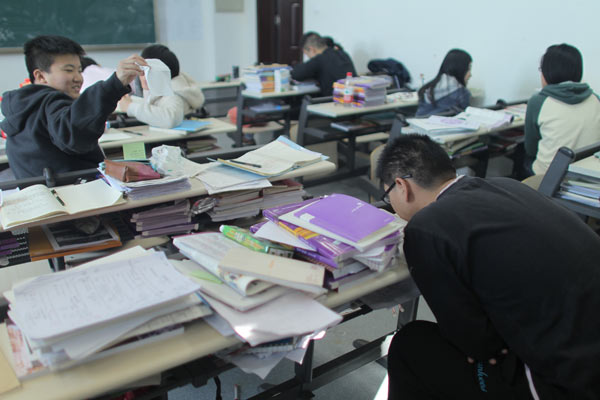

 |
|
Students attend a cram school in Beijing's Changping district. Pressure to pass the college entrance exam, which is held once a year, may be relieved in the wake of reform proposed by the Ministry of Education that allows some subjects to be tested more than once a year. Wang Jing / China Daily |
Under reform plan for college admissions, students can try more than once a year
Li Yao had never really entertained the idea of going to a "cram school" until he failed to get the required test results for college admission.
A cram school is for students who were not admitted to their first-choice universities in gaokao, China's college entrance exam, which is held once a year. They spend a year at the school, preparing for next year's gaokao.
A boarder at a gaokao cram school in the capital's Changping district, Li, 19, scored 480 in his first gaokao in 2013. But this was not enough to be admitted by the University of International Business and Economics, his dream university, whose pass mark was 600.
"I did not want to go, because it sounds like a nightmare to spend 12 months experiencing the hard work and stress of my last year in high school all over again," he said.
But in the future, students like Li may not have to stay for a year in such schools.
Education experts and insiders said the pattern of cram schools will evolve because of gaokao reform, and the number of students who opt for gaokao cram schools may actually increase in the future.
Recently, a draft reform plan for gaokao, or China's college entrance examination, was released by the Ministry of Education, saying that some subjects, such as English, will be tested more than once each year, and only the highest score will be counted.
This means that student admission results will not be decided by a one-time examination. They will have more chances to get a satisfactory score and be admitted by their first-choice universities.
Zheng Guanfei, a senior manager of gaokao cram school programs under the New Oriental Education and Technology Group, said more chances for success in gaokao mean students don't have to spend a whole year reviewing all the subjects in cram school.
"Instead, they can take short courses on specific subjects at a gaokao cram school for one month, two months or half a year, according to their own plans," said Zheng, who had been working on the programs with New Oriental for more than six years.
Chu Zhaohui, a senior researcher with the National Institute of Education Sciences, looked at cram schools in 2007. He estimated that there were 3 million students out of 10 million across the country attending them that year.
Zheng said Beijing has many such schools, most of which are boarding schools.
They recruit 6,000 to 10,000 students each year, accounting for 10 or more percent of all students taking the gaokao in the city. Fees for each student are 30,000 yuan ($4,900) to 40,000 yuan for the whole year, not including living expenses.
The high cost of time, money, and pressure means the year was often a nightmare, Zheng said.
But things may be different in the future with more options to take up short-term courses.
"Under such circumstances, students will be more willing to go to a cram school," Chu said.
However, some still have doubts.
Hu Ruiwen, a member of the National Education Advisory Committee, said changes will happen only when more subjects in the gaokao, not just English, can be tested more than once a year.







